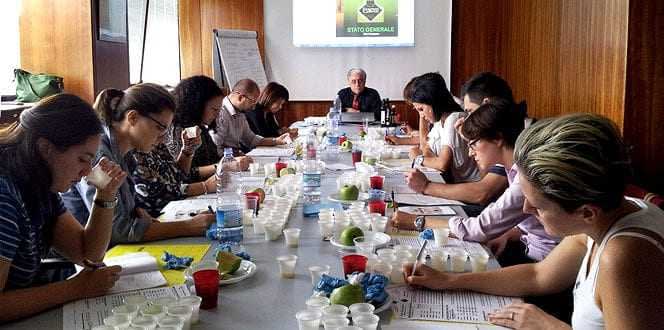In the last few years technology has taken the lead in olive oil production, even here in Italy where it has always been a traditional activity strongly related to craftsmanship and family business. Modern machines and processing systems are essential to obtaining the best from olives, but complicated contraptions and techspeak could scare away producers.
That’s why Gruppo Pieralisi, a leading company for olive oil extraction systems, asked Dr. Gino Celletti to join their international team as a consultant to help communicate and popularize the group’s technological developments.

Celletti is well known in the world of olive oil for tasting expertise and for his communication initiatives. The creator of the Monocultivar Olive Oil project, that includes tasting courses and exhibitions dedicated to single olive varieties, he is also the chief judge and panel leader of the upcoming New York International Olive Oil Competition. With extensive background in biology and biochemistry and long experience as an olive oil production and marketing consultant and restaurateur, there is no wonder why he was tapped by Pieralisi to handle the assignment.
Celletti will manage the group’s communication activities, but he will also train Pieralisi staff in olive oil tasting and assessment. To help them spread the culture of extra virgin olive oil, he implemented an educational series Master on Monocultivar Olive Oils that will involve all of the group’s employees and consultants. He will soon start a worldwide training program with the help of his wife Maria Santarelli, an expert taster herself.
“You need to put things in simple words,” Celletti said. “Pieralisi is a huge company founded and run by engineers, that is producing the world’s most advanced technologies in the olive oil industry. But they needed someone who could help promote and communicate all this in simpler ways. Average consumers, and sometimes also the producers, don’t have a deep knowledge of the olive oil producing process from a technological point of view. They want to buy, and make, the best olive oils but you have to explain how that is possible. So we agreed on a 5‑year long agreement to develop a marketing and communication plan to teach their staff to taste and value olive oil, but also to explain and sell their own products in an effective way.”
One of the first steps of Celletti’s new assignment was the communication of the DMF (multi-functional decanter), an up-to-date decanting technology that gave birth to Leopard, the only two-phase decanter that can combine modern extraction technology without the addition of water with batch processing, thanks to the bowl discharging device. This results in producing a dehydrated husk similar to the one coming from a three-phase decanter, and also separates the pulp (“pâté”) from the husk, obtaining an ideal ingredient for composting or animal feeding.
“You can have many positive effects from this,” Celletti explains. “Producers will obtain intensely perfumed and fruity olive oils, with a distinctive bitterness and spicy taste and they will reduce water and energy consumption. But they will also able to use – or sell — the pâté in many different ways, from composting to bread making, using it as a yeast-starter. They will save money on wastewater disposal and will be able to use the dry olive residues as eco-friendly fuel.”
Pointing out the benefits is key. “You have to communicate not only the features, but the advantages of technology,” said Celletti.
